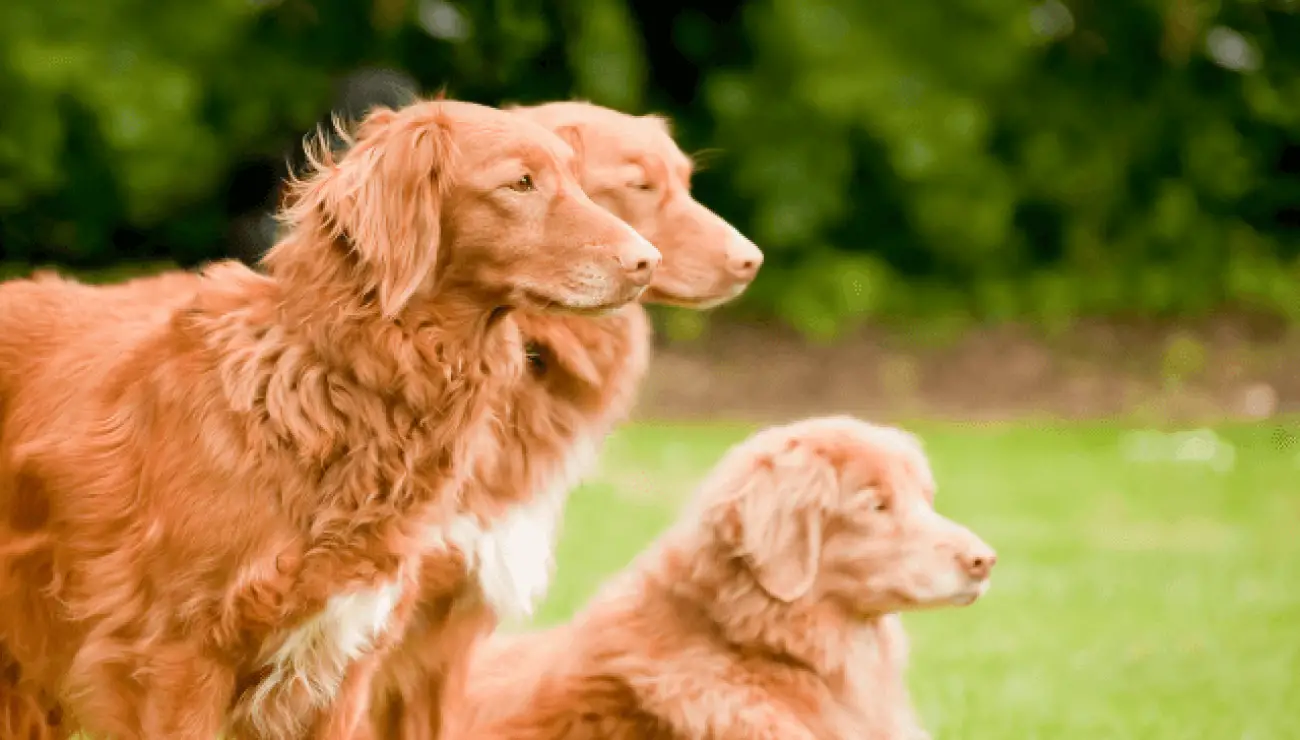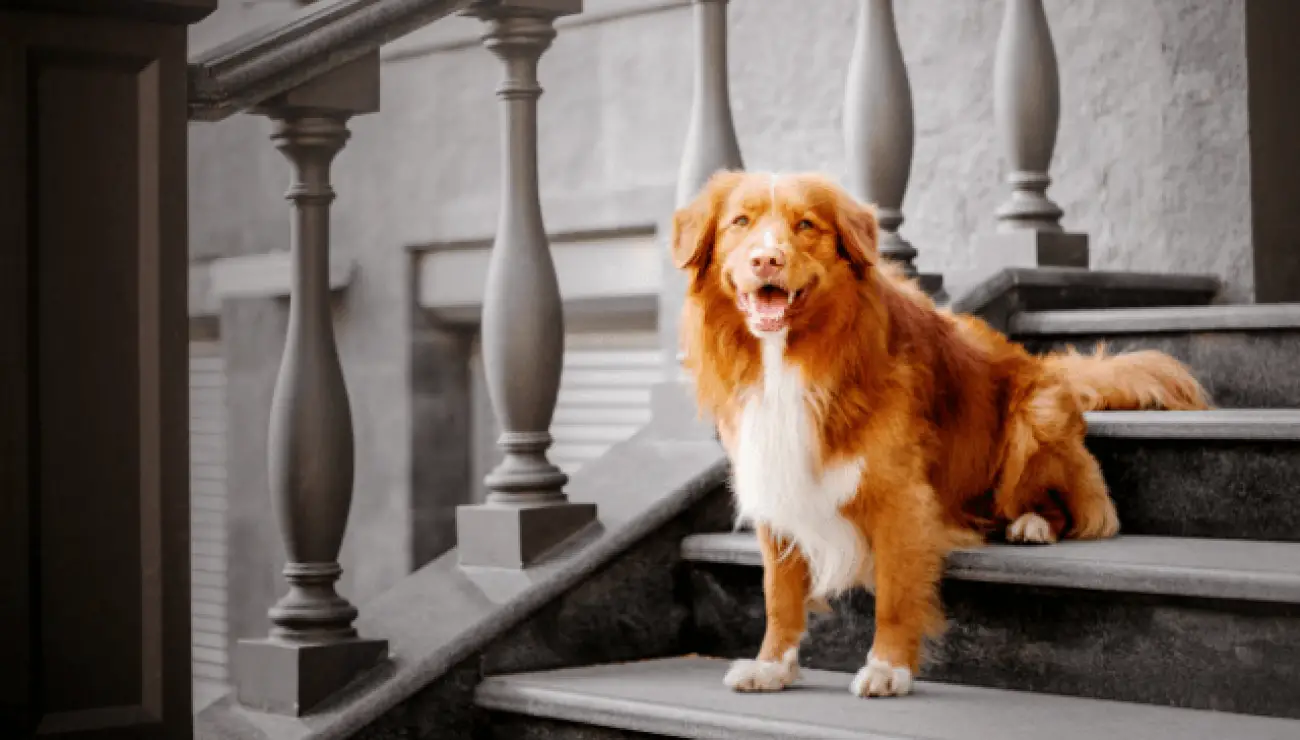Nova Scotia Duck Tolling Retriever
The Nova Scotia Duck Tolling Retriever, as their name suggests, was created for waterfowl hunting purposes. These dogs are great hunters with a lot of energy to work tirelessly.
Like many hunting breeds, the Toller also has a lot of energy that needs to be spent and channeled into something positive like playing games or swimming in order for them not to become problematic and develop behavioral problems. These dogs are versatile and easily adapt to any kind of living condition.
All of the Retriever breeds share similar traits such as intelligence, great working ability, and a cheerful character. This smallest of the Retriever breeds shares most of these characteristics, the Toller is happy and cheerful but is usually more stubborn than a Golden or a Labrador.
They can be pretty strong-willed and if not raised and socialized properly, will try to assume the leading position at home. If you own a Toller, you need to be firm and consistent as these dogs will probably test your boundaries.

Height:
17-21 in (43-53 cm)

Weight:
35-50 lb (16-23 kg)

Origin:
Canada

Life Expectancy:
12-14 years
Dog Breed Characteristics
Grooming
Toller has a double coat that is weather repellent. In order to remove dead hair, prevent tangles, and secure that the dog looks good, weekly brushing is required throughout the year. Toller dogs shed heavily twice a year, and at that period, daily brushing is a must to keep the amount of hair under control.
Toller coat colors:
- Any shade of red – from golden red to dark coppery red
Brown coats and black areas in coats are not allowed by the breed standards.

Brush their teeth at least three times a week to prevent tartar buildup and infections. Make sure you use products that are made especially for dogs, as human products could potentially harm them. Trim their nails if they don’t wear them down naturally.
A good indication is if you can hear them clicking on the floor while they walk. Clean their ears and check for signs of redness or infections. Use a cotton cloth and never insert anything in their ear canal. You can always check with your Vet about the products you should use and the proper technique.
Exercise
Nova Scotia Duck Tolling Retriever is a medium active dog breed that requires a few daily activities to be happy and healthy. Ball retrieving or simple walks can be enough for this dog, although some individuals can demand more activities.
These dogs love to engage with their owners. Because of that, they are excellent participants in canine sports such as agility and flyball.

Personality
Toller was bred for hunting, and because of that, they will need proper training if you want your dog to develop into a well-behaved dog. Also, their high prey drive can be a problem that you will need to take care of.
When training a Toller, make sure you use positive training methods. Never use fear, punishment, or pain because not only is it cruel, it can result in an overly shy or even aggressive dog. Be firm, fair, and consistent, but use only positive reinforcement!
These dogs are eager to do whatever their people ask of them. Involve as many treats as you can and keep the training sessions interesting.
Socialization can even be done at home. Dress differently; wear glasses, hats, and baggy clothes so your puppy can’t recognize you right away. Teach your puppy to stay alone for a while and not make a fuss about it. It is the best way to make sure your puppy will grow up to be a stable, confident, and well-behaved dog.

Toller and children
Early socialization and proper training can teach them to behave even when children are around. They are best suited for older kids who can keep them occupied by throwing balls, learning new tricks, etc. If you train and socialize your dog well, your children will get a great playing partner with plenty of energy.
These dogs can play for hours upon hours without getting tired or bored.
Children should never be left alone with any dog, no matter what breed. You should make sure that your children understand how to approach dogs of this breed and understand how to interact and play with them properly.

Toller and animals
These dogs can get along well with other dogs and can enjoy their company. Generally, the Toller is a great pet if you already have other pets at home. They are extremely friendly and love having company, so your Nova Scotia Duck Tolling Retriever won’t mind other pets.
However, every dog, no matter what breed they are, should be socialized and properly introduced to other pets. Take your time, and even if your dog doesn’t react well on your first try doesn’t mean they won’t get along. Some dogs require time, but Tollers are generally very affectionate and gentle towards other pets, especially if they were raised together.
Health problems
Like any other dog breed, the Nova Scotia Duck Tolling Retriever can potentially develop health problems. If you are buying a dog, ensure the breeder can provide you with the necessary health tests and guarantees. Always ask to see the results of tests from the puppy’s parents. The health problems these dogs are associated with are:
- Hip dysplasia - Genetic problem affecting hips resulting from an improperly formed hip joint.
- Progressive Retinal Atrophy - Group of diseases that affect the retina and cause it to deteriorate over time.
- deafness
- collie eye

The Nova Scotia Duck Tolling Retriever is generally considered a very healthy breed that can live 12-14 years.
To be sure that your dog will be healthy, always buy him from a responsible dog breeder who regularly tests their breeding dogs to secure that their puppies will be healthy as well.
Nova Scotia Duck Tolling Retriever breeders
Before you go searching for a registered Nova Scotia Duck Tolling Retriever breeder, make sure that this is the breed that is going to suit you the most. These dogs can be a handful and need to have a lot of experience to be able to properly take care of this breed. Make sure to find a reputable breeder that can answer all of your questions about this breed.
These dogs became very popular, and many unethical and bad breeders started to breed these dogs to earn money without worrying about puppy health, temperament, and well-being.
Buying a dog from a responsible breeder will cost you more money, but you can be sure that you will get a healthy puppy. If you are unable to buy a dog, we advise you to search for local animal shelters because there is a chance you can find Toller dog in it.

When you bring your new puppy home, start with the training and socialization immediately. By doing so, you will end up with a well-behaved dog whom you can trust. Provide him with enough daily exercise for him to be happy. With this dog, you must be firm, and you must be an alpha for him to listen to you.
If you devote your time and energy to this dog, you can be sure that you will end up with a companion for life.
World Dog Finder team

Updated at31.08.2023.
Breed History
They first came to life in a Canadian Atlantic coast province called Nova Scotia more precisely, in Little River. Their first name was Little River Duck Dogs and after a while, their name was changed to its modern-day version. Since it is quite a long name it is often shortened to just Toller.



















Share